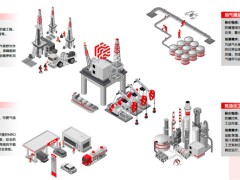据钻机地带网站6月12日报道,“生成式人工智能将对各行各业产生深远影响”——亚马逊网络服务公司(AWS)的能源企业技术专家侯赛因·谢尔(Hussein Shel)表示,这正是该公司所相信的。他表示,20多年来,亚马逊在面向客户的服务和内部运营的人工智能和机器学习的开发和部署方面投入了大量资金。
谢尔告诉钻机地带网站称,我们现在将看到机器学习的下一波广泛应用,包括能源行业在内的每一个客户体验和应用都有机会通过生成人工智能进行重塑。他补充道,AWS将帮助推动下一波浪潮,让客户在技术堆栈的所有三层(包括基础设施、机器学习工具和专用人工智能服务)中轻松、实用、经济地使用生成式人工智能。
在谈到生成式人工智能在能源行业的一些应用和好处时,谢尔概述说,AWS认为该技术在提高运营效率、减少健康和安全风险、增强客户体验、最大限度地减少与能源生产相关的排放以及加速能源转型方面发挥着关键作用。
首先,生成式人工智能可以在解决运营现场安全问题方面发挥关键作用。
能源运营通常发生在偏远的,有时是有害的和危险的环境中。该行业长期以来一直在寻求有助于减少前往现场的解决方案,这与减少工人的健康和安全暴露直接相关。生成式人工智能可以帮助行业朝着这一目标取得重大进展。现场摄像机的图像可以发送到生成式人工智能应用程序,该应用程序可以扫描潜在的安全风险,例如导致气体泄漏的故障阀门。
其次,生成式人工智能将有利于油藏建模。
他补充说,生成式人工智能模型可以通过生成可以模拟油藏行为的合成油藏模型来用于油藏建模。GAN是一种流行的生成式人工智能技术,用于生成合成油藏模型。GAN的生成器网络经过训练,生成与真实油藏相似的合成油藏模型,而鉴别器网络经过训练,可以区分真实油藏模型和合成油藏模型。
谢尔称,一旦生成模型经过训练,就可以生成大量的合成油藏模型,用于油藏模拟和优化,减少不确定性,提高油气产量预测。这些储层模型还可以用于其他对深地探索至关重要的能源应用,如地热和碳捕获和储存。
最后,基于生成式人工智能的数据搜索将大大提速。
他表示,数据访问是能源行业寻求克服的一个持续挑战,特别是考虑到其大部分数据都是几十年前的,并且存在各种系统和格式。
他补充说,例如,油气公司在整个工作流程中以不同格式创建了数十年的文件,即pdf、演示文稿、报告、备忘录、测井日志、word文档,寻找有用的信息需要花费相当多的时间。
谢尔继续道,据一家排名前五的运营商称,工程师们将60%的时间用于搜索信息。通过索引增强基于生成人工智能的解决方案来获取所有这些文档,可以极大地改善数据访问,从而更快地做出更好的决策。
当被问及是否认为所有的石油和天然气公司都将在未来以某种方式使用生成式人工智能时,谢尔说他认为答案是肯定的,但他补充说,要强调的是,在定义生成式人工智能对能源行业的潜在影响时,现在还处于早期阶段。
谢尔告诉钻机地带,在AWS,我们的目标是普及生成式人工智能的使用。
他补充道,为了做到这一点,我们为客户和合作伙伴提供他们想要使用生成式人工智能构建方式的灵活性选择,例如使用专用机器学习基础设施构建自己的基础模型;利用预先训练的基础模型作为基础模型来构建其应用程序;或者使用内置生成式人工智能的服务,而不需要任何基础建模方面的专业知识。
他继续说道,我们还提供经济高效的基础设施和正确的安全控制,以帮助简化部署。
通过机器学习应用的人工智能将是我们这一代最具变革性的技术之一,“解决一些人类最具挑战性的问题,提高人类的表现,并最大限度地提高生产力”。
谢尔概述道,因此,负责任地使用这些技术是促进持续创新的关键。
AWS参加了美国石油工程师协会(SPE)国际墨西哥湾沿岸分会最近在得克萨斯州休斯敦举行的数据科学大会活动,钻机地带网站总裁出席了该活动。该活动被称为SPE-GCS数据分析研究小组的年度旗舰活动,接待了来自能源和技术部门的代表。
上个月,GlobalData在发给钻机地带网站的一份声明中指出,机器学习有可能改变油气行业。
GlobalData在声明中表示,机器学习在油气行业是一个快速发展的领域,有可能提高油气行业的效率、提高产量和降低成本。
在5月份发布的一份关于油气行业机器学习的报告中,GlobalData强调了几个“主要的参与者”,包括bp、埃克森美孚、马来西亚国家石油公司、沙特阿美公司、壳牌公司和道达尔能源。
本月初,数据解决方案公司Prescient的创始人兼首席执行官Andy Wang在接受钻机地带采访时表示,数据科学是油气的未来。
Andy Wang强调,数据科学包括许多数据工具,包括机器学习,他指出这将是该行业未来的重要组成部分。当被问及他是否认为越来越多的石油公司会采用数据科学和机器学习时,Andy Wang对这两个问题都做出了积极的回应。
早在2022年11月,自称人工智能研究和部署公司、使命是“确保人工智能造福全人类”的OpenAI就推出了ChatGPT。2022年11月30日OpenAI在其网站上发布声明称,ChatGPT是InstructionGPT的兄弟模型,该模型经过训练,能够在提示中遵循指令并提供详细的响应。
郝芬 译自 钻机地带
原文如下:
Generative AI Will Have Profound Impact Across Sectors
Generative AI will have a profound impact across industries.
That’s what Amazon Web Services (AWS) believes, according to Hussein Shel, an Energy Enterprise Technologist for the company, who said Amazon has invested heavily in the development and deployment of artificial intelligence and machine learning for more than two decades for both customer-facing services and internal operations.
“We are now going to see the next wave of widespread adoption of machine learning, with the opportunity for every customer experience and application to be reinvented with generative AI, including the energy industry,” Shel told Rigzone.
“AWS will help drive this next wave by making it easy, practical, and cost-effective for customers to use generative AI in their business across all the three layers of the technology stack, including infrastructure, machine learning tools, and purpose-built AI services,” he added.
Looking at some of the applications and benefits of generative AI in the energy industry, Shel outlined that AWS sees the technology playing a pivotal role in increasing operational efficiencies, reducing health and safety exposure, enhancing customer experience, minimizing the emissions associated with energy production, and accelerating the energy transition.
“For example, generative AI could play a pivotal role in addressing operational site safety,” Shel said.
“Energy operations often occur in remote, and sometimes hazardous and risky environments. The industry has long-sought solutions that help to reduce trips to the field, which directly correlates to reduced worker health and safety exposure,” he added.
“Generative AI can help the industry make significant strides towards this goal. Images from cameras stationed at field locations can be sent to a generative AI application that could scan for potential safety risks, such as faulty valves resulting in gas leaks,” he continued.
Shel said the application could generate recommendations for personal protective equipment and tools and equipment for remedial work, highlighting that this would help to eliminate an initial trip to the field to identify issues, minimize operational downtime, and also reduce health and safety exposure.
“Another example is reservoir modeling,” Shel noted.
“Generative AI models can be used for reservoir modeling by generating synthetic reservoir models that can simulate reservoir behavior,” he added.
“GANs are a popular generative AI technique used to generate synthetic reservoir models. The generator network of the GAN is trained to produce synthetic reservoir models that are similar to real-world reservoirs, while the discriminator network is trained to distinguish between real and synthetic reservoir models,” he went on to state.
once the generative model is trained, it can be used to generate a large number of synthetic reservoir models that can be used for reservoir simulation and optimization, reducing uncertainty and improving hydrocarbon production forecasting, Shel stated.
“These reservoir models can also be used for other energy applications where subsurface understanding is critical, such as geothermal and carbon capture and storage,” Shel said.
Highlighting a third example, Shel pointed out a generative AI based digital assistant.
“Data access is a continuous challenge the energy industry is looking to overcome, especially considering much of its data is decades old and sits in various systems and formats,” he said.
“Oil and gas companies, for example, have decades of documents created throughout the subsurface workflow in different formats, i.e., PDFs, presentations, reports, memos, well logs, word documents, and finding useful information takes a considerable amount of time,” he added.
“According to one of the top five operators, engineers spend 60 percent of their time searching for information. Ingesting all of those documents on a generative AI based solution augmented by an index can dramatically improve data access, which can lead to making better decisions faster,” Shel continued.
When asked if the thought all oil and gas companies will use generative AI in some way in the future, Shel said he did, but added that it’s important to stress that it’s still early days when it comes to defining the potential impact of generative AI on the energy industry.
“At AWS, our goal is to democratize the use of generative AI,” Shel told Rigzone.
“To do this, we’re providing our customers and partners with the flexibility to choose the way they want to build with generative AI, such as building their own foundation models with purpose-built machine learning infrastructure; leveraging pre-trained foundation models as base models to build their applications; or use services with built-in generative AI without requiring any specific expertise in foundation models,” he added.
“We’re also providing cost-efficient infrastructure and the correct security controls to help simplify deployment,” he continued.
The AWS representative outlined that AI applied through machine learning will be one of the most transformational technologies of our generation, “tackling some of humanity’s most challenging problems, augmenting human performance, and maximizing productivity”.
As such, responsible use of these technologies is key to fostering continued innovation, Shel outlined.
AWS took part in the Society of Petroleum Engineers (SPE) International Gulf Coast Section’s recent Data Science Convention event in Houston, Texas, which was attended by Rigzone’s President. The event, which is described as the annual flagship event of the SPE-GCS Data Analytics Study Group, hosted representatives from the energy and technology sectors.
Last month, in a statement sent to Rigzone, GlobalData noted that machine learning has the potential to transform the oil and gas industry.
“Machine learning is a rapidly growing field in the oil and gas industry,” GlobalData said in the statement.
“Overall, machine learning has the potential to improve efficiency, increase production, and reduce costs in the oil and gas industry,” the company added.
In a report on machine learning in oil and gas published back in May, GlobalData highlighted several “key players”, including BP, ExxonMobil, Gazprom, Petronas, Rosneft, Saudi Aramco, Shell, and TotalEnergies.
Speaking to Rigzone earlier this month, Andy Wang, the Founder and Chief Executive Officer of data solutions company Prescient, said data science is the future of oil and gas.
Wang highlighted that data sciences includes many data tools, including machine learning, which he noted will be an important part of the future of the sector. When asked if he thought more and more oil companies would adopt data science, and machine learning, Wang responded positively on both counts.
Back in November 2022, OpenAI, which describes itself as an AI research and deployment company whose mission is to ensure that artificial general intelligence benefits all of humanity, introduced ChatGPT. In a statement posted on its website on November 30 last year, OpenAI said ChatGPT is a sibling model to InstructGPT, which is trained to follow an instruction in a prompt and provide a detailed response.
免责声明:本网转载自其它媒体的文章及图片,目的在于弘扬石化精神,传递更多石化信息,宣传国家石化产业政策,展示国家石化产业形象,参与国际石化产业舆论竞争,提高国际石化产业话语权,并不代表本网赞同其观点和对其真实性负责,在此我们谨向原作者和原媒体致以崇高敬意。如果您认为本站文章及图片侵犯了您的版权,请与我们联系,我们将第一时间删除。







